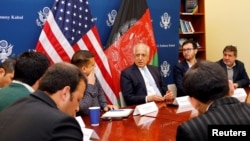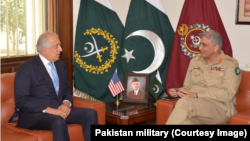Both the United States and Taliban are indicating that the current round of negotiations in Doha that started Monday may prove more crucial than any other meeting till now.
The U.S. Special Representative for Afghanistan Reconciliation Zalmay Khalilzad called the Taliban’s new negotiating team "more authoritative," adding that this could indicate a "significant moment." The Taliban negotiating team's' spokesman Suhail Shaheen told VOA his side was hoping for "clear and fruitful results" out of the current round.
Khalilzad also met, for the first time, with one of the founding members of the Taliban, Mullah Abdul Ghani Baradar, whom he helped get released from Pakistani custody last October to facilitate the peace talks.
Last month, Baradar was appointed the head of Taliban’s political office in Qatar that is leading the negotiations by Taliban chief Hibatullah Akhundzada. He was also given the position of Akhundzada’s political advisor, indicating his importance in the group. Khalilzad thanked Pakistan for facilitating his travel to Qatar.
Monday’s lunch reception in Doha, hosted by Qatar, was an introduction in which representatives of United Arab Emirates were also present, according to Taliban spokesman Zabiullah Mujahid. The real talks would start early Tuesday and were expected to last several days. The last round in early January ran for six days.
"Now the work begins in earnest," U.S. Special Representative Khalilzad tweeted.
The agenda, according to Shaheen, remained the same two issues that both sides have recognized as the core concerns in ending the 18-year conflict: the withdrawal of foreign forces from Afghanistan and ensuring that Afghan soil is not used by any terrorist group or individual for attacks against America and its allies.
The Taliban negotiation team, announced earlier this month, has 14 members, including Anas Haqqani, the younger brother of Haqqani Network chief Sirajuddin Haqqani. The network is blamed for some of the deadliest attacks on NATO forces in Afghanistan. The Afghan government has indicated it is not planning to free Anas, who is on death row.
The Taliban claim Anas Haqqani was a student and had no military role, but Afghan intelligence calls him a "mastermind" of social media propaganda for the Taliban. Many analysts think his inclusion in the negotiating team is a way to build pressure on the Afghan government to release him.
Khalilzad and his team, which includes representatives from the U.S. State Department, the Pentagon, and the National Security Council, have made multiple tours of the region since he was first appointed in September last year to help find a negotiated end to the conflict. He has engaged directly with almost all countries with a stake in Afghanistan, except Iran, but said at a public event at Washington-based United States Institute of Peace, that a "formal framework for regional participation" was yet to take shape.
The Taliban and the U.S. have set up working groups to negotiate on the two core issues and Shaheen said the two sides expected them to work on "recommendations and a draft agreement."
The current conflict in Afghanistan, which started in 2001, has already turned into America’s longest war and many in Washington who are close to the current administration have indicated that President Donald Trump’s patience with the status quo is running thin.
"My original instinct was to pull out—and, historically, I like following my instincts," Trump said when announcing his new strategy for Afghanistan in 2017.
However, fearing a "hasty withdrawal would create vacuum that terrorists, including ISIS and al-Qaida would instantly fill," Trump pushed hard to bring the Taliban to the negotiating table by giving his generals more battlefield authority on one hand and increasing pressure on neighboring Pakistan on the other. The U.S. has long accused Pakistan of providing safe havens to the Taliban—a charge Islamabad denies.
The first breakthrough in the current process happened last July when U.S. officials gave in to a major Taliban demand—to negotiate directly with them, without the Kabul administration in the room.
Since then, while the U.S. side has continued negotiating with the Taliban, it has also pushed hard to get them to engage with Afghan President Ashraf Ghani’s team. The militant group continues to refuse, even as its representatives met with dozens of other Afghan political leaders, former jihadi commanders, and civil society activists at a recent conference in Moscow.
At his USIP talk, Khalilzad said the Taliban did not want to give Ghani a boost before the upcoming presidential elections and were more likely to "sit with the government in a multi-party arrangement."
Meanwhile, Mohammad Umar Daudzai, the chief secretary of Afghanistan’s High Peace Council, has said the Taliban should be "in principle" invited to a Loya Jirga or grand assembly, scheduled to take place in March but the decision will be taken by a supervisory commission overlooking the preparations.
Plans to hold the assembly were announced two weeks ago after Ghani accepted a proposal by civil society activists to gather all segments of Afghan society and develop a consensus on the framework of a peace agreement.





